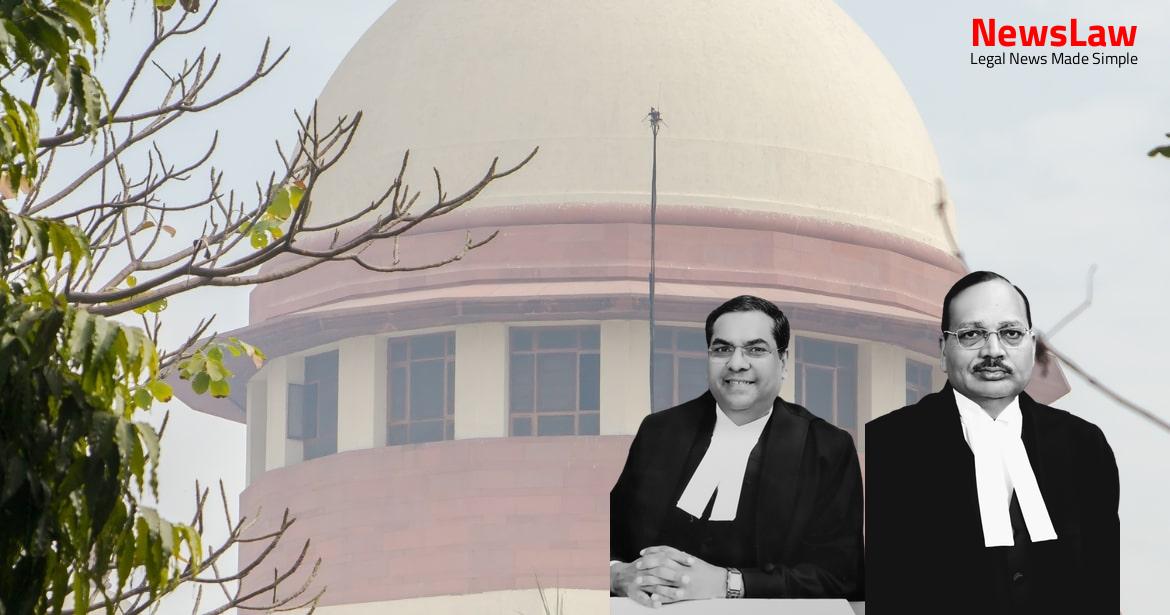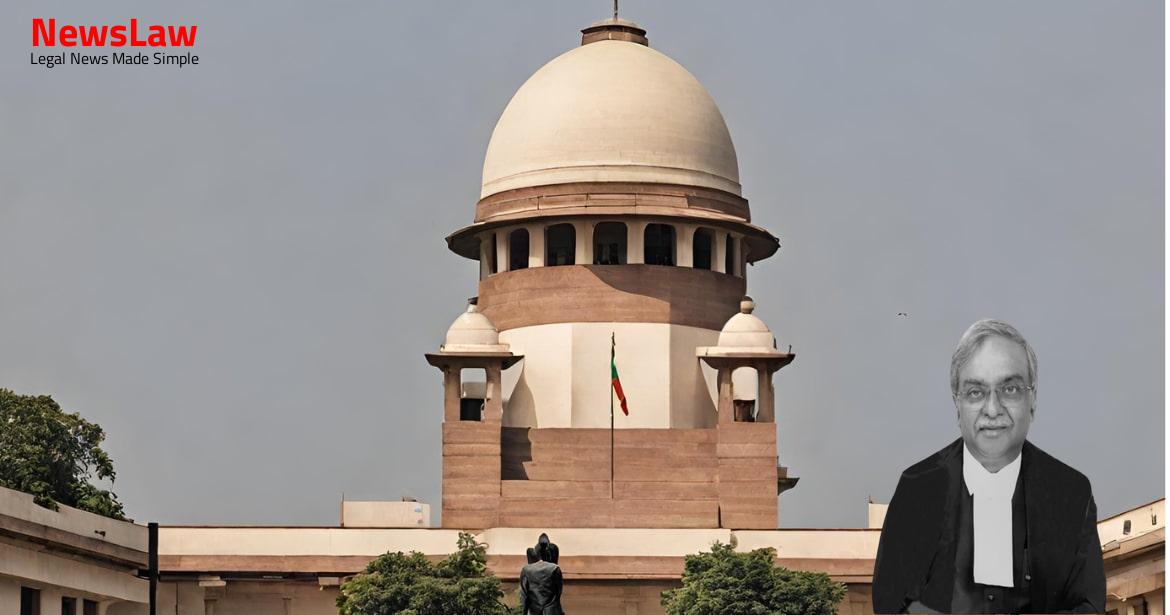In a landmark ruling by the Supreme Court of India, the judgment upholding the death penalty in a brutal rape and murder case has set a strong precedent for justice. The case involved the accused, whose involvement in the crime was proven through extensive evidence and meticulous legal scrutiny. This decision marks a pivotal moment in the Indian legal system’s stance against extreme violence and serves as a beacon of hope for victims seeking retribution and closure.
Facts
- The Appellant was involved in a ghastly rape and murder case involving two children, a girl aged 10 and her 7-year-old brother.
- The Appellant allegedly committed rape on the girl whose hands were tied by both him and another accused named Mohanakrishnan.
- After the brutal rape, the children were given a poisonous substance called cow dung powder mixed with milk in an attempt to kill them.
- The children survived after ingesting a small portion of the poisonous substance.
- The Appellant and Mohanakrishnan then threw the children into a canal to dispose of them.
- Witnesses saw the Appellant and Mohanakrishnan with the children at different times on the day of the crime, supporting the prosecution’s case.
- The High Court concluded that the Appellant was involved in the rape of the girl.
- The High Court of Madras confirmed the death sentence imposed by the trial court after considering aggravating and mitigating circumstances.
- The accused, despite completing a Bachelor’s Preparatory Program and having a clean jail record, had his death penalty reconfirmed through a review petition.
- Aggravating circumstances in the case included the rape of a minor and the murder of two children in a barbaric manner.
- The accused attempted to poison the children by mixing cow dung powder and milk, but the children spit it out, leading to a realization that they may not die.
- Although acquitted for the specific offence, the accused was linked to the crime through the ‘last seen theory’ established by witness testimonies.
Also Read: Judgment on Contract Dispute: PSA Mumbai Investments PTE. Ltd. v. Jawaharlal Nehru Port Trust
Arguments
- The Appellant’s counsel argued that PW.24’s testimony, a key witness to the last seen theory, is unreliable as he claims to have seen the children after the girl was raped but found nothing unusual with them.
- The counsel adopted arguments by another lawyer to refute the allegation of the Appellant raping the 10-year-old girl, citing DNA evidence linking the Appellant to the crime.
- The counsel questioned the credibility of PW.24’s testimony due to its incredibility and the alleged police coercion during the confessional statement recording.
- The argument that the victim would not be paraded around after the assault was debunked citing the confessional statement that contained details of the crime.
- The absence of semen or blood on the victim’s body was deemed insignificant in light of the DNA evidence implicating the Appellant.
- The respondent’s counsel argued that the crime was extremely heinous, ruthless, and cold-blooded.
- They emphasized that the aggravating circumstances highlighted by the High Court outweigh any alleged mitigating factors.
- The respondent’s counsel asserted that this case merits the imposition of the death penalty.
- Referring to the precedent in Machhi Singh v. State of Punjab, it was pointed out that certain circumstances may warrant a death sentence for murder.
- The community’s endorsement of the humanistic approach against imposing the death penalty in all cases was discussed.
Also Read: Landmark Judgment: Abhyudaya Co-operative Bank Ltd. vs. Guravs
Analysis
- The confession statement of Manoharan was recorded on 20.11.2010 and retracted on 13.08.2012 during cross-examination.
- The High Court confirmed that the confession statement was voluntarily made by Manoharan.
- The retraction made one year and nine months after the confession statement cannot exculpate Manoharan from the crimes committed.
- The High Court scrutinized the questions posed by the Judicial Magistrate to ensure the confession’s legality.
- The confession statement was corroborated by medical evidence, oral testimony, and dying declarations, proving Manoharan’s crimes.
- Manoharan’s lack of remorse and attempts to absolve himself indicate no scope for reformation.
- The High Court balanced aggravating and mitigating circumstances, ultimately affirming the death sentence as appropriate.
- The Court affirmed the death sentence awarded to the accused persons for their involvement in a brutal gang rape, unnatural sex, and insertion of an iron rod into the victim’s private parts.
- The case was compared to other instances where death sentences were awarded for violent crimes to justify the decision.
- The Court highlighted the heinous nature of the crime and the brutal manner in which it was committed, leading to the decision of death penalty.
- The principle of a ‘rarest of rare category’ was emphasized to justify the imposition of the death penalty in such cases.
- Several previous judgments were referred to support the decision of upholding the death penalty in cases involving extreme brutality and violence.
- The need for stringent measures to deter crimes like child sex abuse was emphasized in the context of the case.
- Mitigating circumstances were considered irrelevant in light of the severity of the offense and its impact on society.
- The decision was guided by societal expectations and the need for a deterrent punishment to maintain public confidence in the criminal justice system.
- Murder of a member of a Scheduled Caste or minority community to terrorize or deprive them of benefits is considered heinous.
- Enormous crimes such as multiple murders or murders of a whole family are grave.
- Victims like innocent children, helpless women, or respected public figures warrant harsh punishment for their killers.
- Amendment increased minimum sentence for aggravated penetrative sexual assault to 20 years or life imprisonment.
- Death penalty should be reserved for cases where life imprisonment is inadequate considering the nature of the crime.
- A balance of aggravating and mitigating circumstances should be considered before imposing the death penalty.
- Death penalty is an exception with life imprisonment being the rule.
- Death penalty can be imposed in ‘rarest of rare cases’ based on collective conscience of the community.
- Factors like the manner and motive of the murder contribute to determining if the death penalty is justified.
- The Appellant’s confessional statement does not demonstrate remorse for the heinous crime committed.
- The Appellant retracted only those parts of the statement implicating him in the rape and murder of the victims.
- The retraction of specific parts of the confession raises doubts about the reliability of his confessional statement.
Also Read: Land-Grabbing Conspiracy Case: Supreme Court’s Landmark Judgment
Decision
- The death sentence was confirmed by the court.
- All appeals were dismissed by the court.
Case Title: MANOHARAN Vs. STATE BY INSPECTOR OF POLICE, VARIETY HALL POLICE STATION, COIMBATORE
Case Number: Crl.A. No.-001174-001175 / 2019



